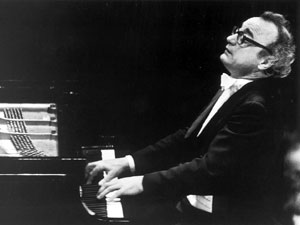. 1727 ~ Armand-Louis Couperin, French composer, organist, and harpsichordist of the late Baroque and early Classical periods.
. 1735 ~ Ernst Wilhelm Wolf, German composer
. 1890 ~ Dame Myra Hess, British pianist
. 1929 ~ Tommy Newsom, Musician: tenor sax, arranger, composer, backup conductor for NBC’s Tonight Show Band
. 1943 ~ George Harrison, British rock singer, guitarist and songwriter and former member of The Beatles group
. 1952 ~ The complete choreographic score of Cole Porter’s “Kiss Me Kate” became the first musical choreography score given a copyright. The work was the effort of Hanya Holm.
. 1953 ~ The musical, “Wonderful Town”, opened at the Winter Garden Theatre in New York City. The show was based on the book, “My Sister Eileen”, and the ran for 559 performances.
. 1955 ~ George Harrison, the lead guitarist for the Beatles and he wrote a few of the songs including “Here Comes the Sun” and “Something”. Following the breakup of the Beatles he released the album All Things Must Pass which included the single “My Sweet Lord” which topped the charts on both sides of the Atlantic.
. 1957 ~ Buddy Holly and The Crickets traveled to Clovis, NM, to record That’ll Be the Day (one of the classics of rock ‘n’ roll) and I’m Looking for Someone to Love. Both songs were released on Brunswick Records in May of that year.
. 1960 ~ John Cage’s “Music for Amplified Toy Pianos” premiered
. 1963 ~ Please Please Me was the second record released in the U.S. by The Beatles. Some labels carried a famous misprint, making it an instant, and valuable, collector’s item. The label listed the group as The Beattles.
. 1966 ~ Nancy Sinatra was high-stepping with a gold record award for the hit, These Boots are Made for Walkin’.
. 1986 ~ We are the World captured four Grammy Awards. The song, featuring more than 40 superstar artists gathered at one time, was awarded the Top Song, Record of the Year, Best Pop Performance and Best Short Video Awards.
. 2001 ~ Ann Colbert, a manager of classical musicians, died at the age of 95. Colbert founded Colbert Artists Management Inc. Her clientele included the Juilliard String Quartet; conductors Sir Georg Solti, Christoph von Dohnanyi and Richard Bonynge; singers Dame Joan Sutherland, Elizabeth Schwarzkopf, Christa Ludwig and Dietrich Fischer-Dieskau; and musicians Alfred Brendel and the late Jean-Pierre Rampal. Colbert moved to the United States from Berlin in 1936 and started the management company with her husband, Henry Colbert, in 1948. She retired in 1991, leaving the company to her longtime associate, Agnes Eisenberger. The company has retained Colbert’s name.
. 2003 ~ Walter Scharf, 92, a composer who earned 10 Academy Award nominations and worked on more than 200 movies and television programs, including “Funny Girl,” “Mission: Impossible” and “White Christmas,” died in Los Angeles. He received Oscar nominations for the scores for such films as “Mercy Island” (1941), “Hans Christian Andersen” (1952), “Funny Girl” (1968), “Willy Wonka and the Chocolate Factory” (1971) and “Ben” (1972). He won an Emmy for his work on a National Geographic television special and a Golden Globe for “Ben,” whose theme song helped launch singer Michael Jackson’s solo career.




